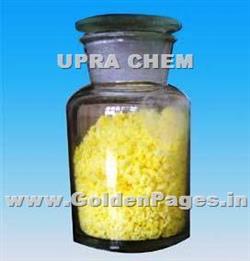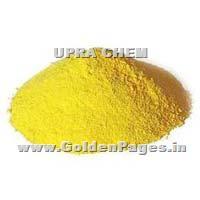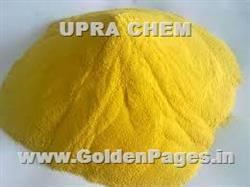UPRA CHEM P.LTD.
Featured Products
Highest quality standards are achieved through the implementations of latest technology, decades of experience and everlasting moral values , which have helped us to retain our customers as well as multiply them.
Welcome to UPRA CHEM P.LTD.
Safety (Msds) Data For Anhydrous Aluminium Chlorode
 Data For Anhydrous Aluminium Chlorode 19271.jpg)
General
Synonyms: Aluminium chloride, Aluminium trichloride, Aluminum chloride, Aluminum chloride - Anhydrous, Trichloroalumium
Molecular formula: Alcl3
CAS No: 7446-70-0
EC No: 231-208-1
Physical data
Appearance: Yellow to Grey solid
Melting point: ca. 190° C (sublimes)
Boiling point:
Vapour density: 4.5 (air = 1)
Vapour pressure: 1.3 mbar at 100° C
Specific gravity: 2.44
Flash point:
Explosion limits:
Autoignition temperature:
Stability
Stable, but reacts violently with water. Prolonged storage may lead to pressure build-up - vent container periodically. Incompatible with alcohols and a variety of other materials (see complete MSDS sheet for full list).
Safety
Corrosive. Reacts violently with water. Reacts with the humidity of air under formation of pungent smelling hydrogen chloride.
During the handling of these products, the data and reference in the safety data sheet are to be considered.
In addition the necessary caution and good industrial hygiene while handling chemicals have to been kept.
As Anhydrous Aluminium Chloride fumes a lot on exposure to air it is environmentally objectionable.
Precautions to address environmental questions should also be considered while handling
Risk phrases
R34. – Causes Burns
Safety phrases
S7 / S8 – Keep Container Tightly Closed and dry
S28 - After contact with skin, wash immediately with plenty of water
S45 – In case of Accident or if you feel unwell, seek medical advice immediately. (Show label where possible)
Toxicology
Corrosive - causes burns. Extremely destructive of mucous membranes. May cause allergic reactions. Harmful if swallowed or inhaled and in contact with the skin.
Toxicity data
ORL-RAT LD50 3450 mg kg -1
ORL-MUS LD50 1130 mg kg -1
SKN-RBT LD50 > 2000 mg kg -1
Personal protection
Safety glasses, rubber gloves. Adequate ventilation.
FIRST AID:
If anhydrous Aluminium Chloride comes in contact with the skin or clothing, do not
wash immediately with water. Severe burns can result from the great amounts of heat produced when anhydrous Aluminium Chloride is dissolved. Wipe off the excess Aluminium Chloride first with a cloth and then wash with large amounts of water.
If liquid Aluminium Chloride comes in contact with the skin or clothing, wash it off immediately and thoroughly with water.
In cases of splashes of liquid Aluminium Chloride in the eyes, flush immediately and thoroughly with large amounts of water and then rinse with a weak solution of sodium bicarbonate or boric acid. Consult a physician immediately.
Transport information
UN No 1726. Packing group II. Major hazard class 8.0.
Our Vision
* To embrace new technologies and methods. * To give unsurpassed products and services to the clients. * To constantly look for improvement and changes.




 Data For Anhydrous Aluminium Chlorode 19271.jpg)



